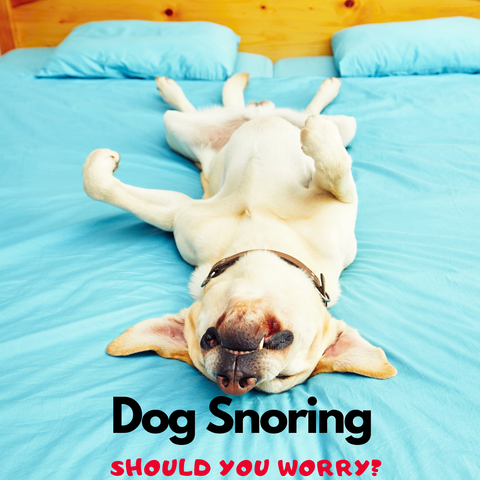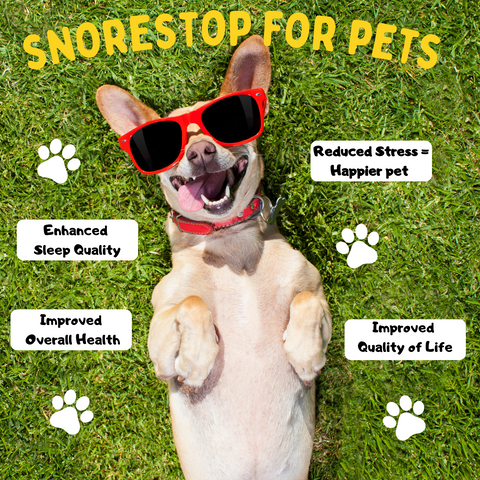
Fear not, pet parent!
HomeBliss & BARK, crafted by Sam, a devoted "dog mom," unravels the intriguing tale behind SnoreStop and explores the realm of pet snoring. Dive into her insights for a wag-worthy read! 🐾
While some snoring in dogs is normal, there are cases where it might be worth a closer look. If your pup's snoring is sudden, severe, or accompanied by other symptoms like labored breathing or coughing, it's wise to consult with a veterinarian. Recording your dog's snoring can be a helpful way to accurately come to a conclusion.
-
Sleeping Position: Just like people, a dog's sleeping position can impact their airways, leading to snoring.
-
Breed Characteristics: Certain breeds are more prone to snoring due to their anatomy. Breeds with short noses, like Boxers, Spaniels, Bulldogs and Pugs, may snore more.
-
Weight: Extra weight can contribute to snoring in dogs, just as it does in humans.
-
Age: Older dogs might snore more as muscle tone decreases with age.
-
Allergies: Allergies can cause nasal congestion in dogs, leading to snoring.
-
Sleeping Environment: Environmental factors like dust or pollen in the sleeping area can contribute to snoring.
-
Sudden Change in Snoring: If your dog's snoring pattern suddenly changes, it could be a cause for concern.
-
Loud and Persistent Snoring: Excessively loud and persistent snoring may indicate an underlying issue.
-
Labored Breathing: If your dog exhibits difficulty breathing or seems to struggle while snoring, it's a red flag.
-
Interrupted Sleep: If your dog's snoring is accompanied by frequent awakenings or restlessness, it may signal a problem.
-
Snoring in Specific Positions: Snoring mainly when in certain positions could suggest respiratory obstruction.
-
Accompanying Symptoms: Look out for other symptoms like coughing, wheezing, or nasal discharge, which may indicate an underlying problem.
What can I do about it?
-
Elevate the Head: Place a small pillow under your dog's head to encourage better airflow or find a dog bed style that's more supportive.
-
Natural Decongestant: A natural snoring solution can help open your dog's airways for better breathing can help them (and you) sleep better.
-
Use an Air Humidifier: Moisture in the air can help reduce nasal congestion, easing snoring.
-
Weight Management: Maintain a healthy weight for your dog through a balanced diet and regular exercise.
-
Regular Vet Checkups: Ensure your dog receives routine veterinary checkups to catch and address any potential health issues.
-
Create a Comfortable Sleep Environment: Make your dog's sleeping area cozy and quiet to promote restful sleep.
Conclusion:
Many snoring solutions for dogs align with human strategies.
Keep your furry friend comfortable and healthy with simple changes, like fresh bedding. For overweight dogs, an exercise routine can make a big difference.
Remember, a happy, healthy pup leads to peaceful nights for everyone!








